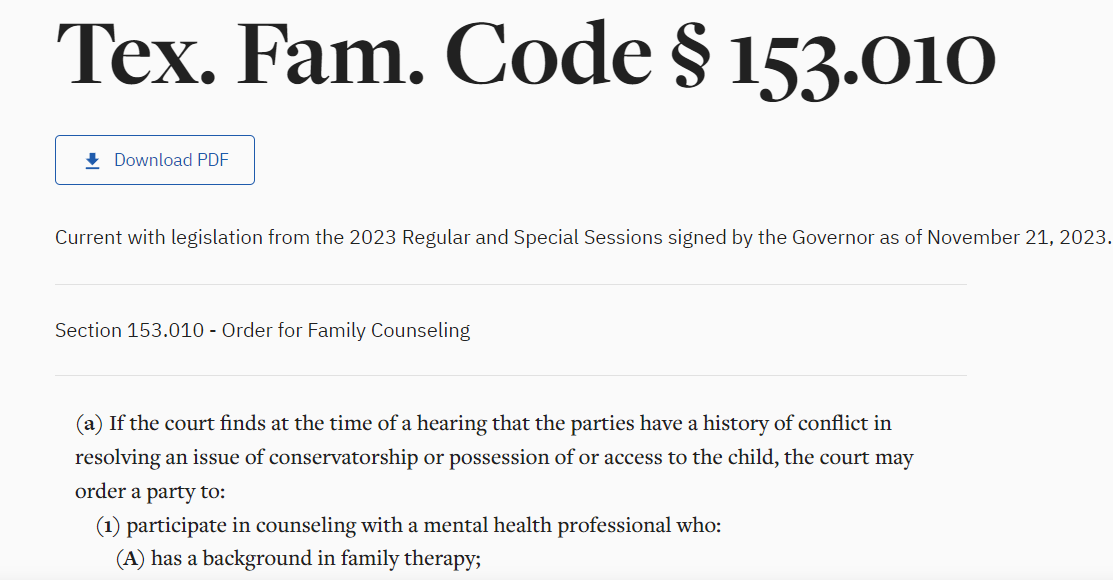Rachel: Emily, things are getting worse as this divorce unfolds. I’m terrified I’ll lose custody of my children and be left with nothing financially.
Emily: I completely understand, Rachel. But have you thought about your therapy sessions? You mentioned you’ve shared a lot about your divorce and family issues as well as personal struggles with your therapist.
Rachel: Yes, I have. I’ve been relying on therapy to get me through this. I made sure to emphasize the need for confidentiality when I called my therapist.
Emily: That’s good, but I’m not sure it’s that simple. If the court finds out about your therapy sessions and what you’ve discussed, they could subpoena your therapy records. It’s crucial to seek legal help as soon as possible and strategize how to handle this situation.
Divorce can stir up a storm of emotions and questions, especially when it comes to the role therapy might play in the proceedings. At Warren & Migliaccio, we’re keenly aware that you might wonder can therapy be used against you in a divorce. We’ll dive into how mental health records could sway decisions on child custody or spousal support, while also looking at Texas law’s stance on therapist-patient privilege and its exceptions. Our experienced team is committed to guiding you through these complexities.
The Interplay of Therapy and Divorce Proceedings in Texas
Going through a divorce can be tough on everyone involved, but therapy often helps people get through it. In Texas, your mental health records generally stay private due to therapist-patient privilege. But when you get entangled in a divorce case, the lines can blur, and your therapy record be used against you in a divorce.
Understanding Therapist-Patient Privilege Under Texas Law

In Texas, what you discuss with your therapist is usually protected under therapist-patient privilege, similar to how attorney-client privilege functions. This means that these private conversations are off-limits during divorce proceedings without your consent or unless specific legal exceptions are met. The law sees this confidentiality as crucial—not only for personal privacy but also for encouraging open and honest communication in therapy.
However, there are some rare instances where the court may decide that what’s been said behind closed doors could be significant enough to warrant disclosure – such as when certain conditions apply under Texas Family Code Section 107, those private discussions could enter the courtroom as evidence.
Exceptions to Confidentiality in Divorce Cases

When one spouse raises concerns about the other’s ability to raise children, it may allow therapy records to be examined by family law attorneys or even presented before a judge.
- If there are allegations of domestic violence,
- Mental illness significantly impacting parenting time,
- Or wasteful spending affecting property division—these instances may lead courts to peek behind the curtain of confidentiality seeking truth that ensures children’s best interests are served.
In some scenarios where abuse has occurred or when child custody arrangements are in doubt, the court considers not only parents’ testimonies but also professional insights from licensed clinical social workers or family therapists involved with either party.
Counselor reports might influence decisions on conservatorship rights while trying not negatively impact those who sought help during difficult times by labeling them unfit based solely on attending therapy sessions—a nuanced aspect experienced family law attorneys understand well when guiding clients through this process.
Awareness around how receiving therapy could intersect with Texas divorce cases emphasizes the importance of talking to an experienced lawyer about this. Texas divorce lawyers know how important it is keeping counseling required discussions safe unless absolutely necessary for ensuring justice within these proceedings—an equilibrium aiming at making sure no harm comes from seeking support during such stressful life events.
Key Takeaway:
Therapy talks usually stay private in Texas, but divorce can change that. If parenting skills or mental health are questioned, your therapy records might get pulled into court. But don’t worry—good lawyers know how to handle this without messing up your case and can help you avoid having your therapy records be used against you in a divorce.
Child Custody and Mental Health Records

Conservatorship Considerations Involving Therapy
Mental health is a significant factor in child custody disputes, as the court’s primary concern is always the child’s best interest standard. When determining conservatorship, Texas family law attorneys often consider how therapy records might reflect on a parent’s ability to care for their child.
Judges consider whether documented mental illness could affect parenting time or if it simply showcases a responsible effort toward personal growth. In cases where one parent alleges that the other suffers from an untreated mental condition impacting their children’s welfare, courts may scrutinize therapy documentation.
However, these evaluations aim not to penalize individuals for receiving therapy but rather to ensure that any revealed issues do not negatively impact the child.
The Role of a Child’s Therapist in Custody Battles

A therapist working with children may inadvertently become involved in divorce proceedings if session reports are used to assess visitation arrangements or even parental fitness. A licensed clinical social worker providing counseling required by previous court orders may present insights about the emotional impact of parental actions or domestic violence incidents on a child.
This does not mean attending therapy automatically casts doubt on one’s capabilities as a parent; instead, it provides context around interactions within the family unit that judges order marriage counselors to evaluate during these difficult times.
Experienced family law attorneys understand that while counselor reports hold weight, they represent just one piece among many considered by Texas courts looking after what will benefit the youth.
Privacy vs. Relevancy in Divorce Litigation

If you’re considering divorce, you might wonder how your right to privacy balances with the court’s need for information from therapy sessions. It’s a delicate interplay that hinges on balancing personal privacy with legal relevance—important factors in any divorce case.
Protecting Therapeutic Records Before Filing for Divorce
Maintaining the confidentiality of mental health discussions is critical prior to initiating divorce proceedings. Proactive measures can help safeguard these sensitive records. Firstly, understand therapist-patient privilege under Texas law—it establishes what may and may not be disclosed without your consent.
In some instances, however, this privilege has its limits during legal battles like a divorce process where relevant evidence is key. For example, if issues of child custody or conservatorship are at stake and your mental health becomes material to parenting abilities or decision-making capacities—a judge could find these records admissible despite their private nature.
To ensure therapeutic conversations remain confidential as much as possible:
- Talk openly with your family law attorney about potential risks associated with therapy disclosures within the context of your case.
- Consider asking therapists about their policies regarding court orders before starting treatment; some may have experience navigating such requests while maintaining patient confidentiality wherever possible.
- You might also consider discussing the avoidance of certain topics in session notes if they are not directly related to therapeutic goals but could become contentious in court later—such as marital issues unrelated to individual psychological well-being or personal growth objectives during marriage counseling periods when both partners attend together yet contemplate separation soon after.
Note: The above strategies do not guarantee absolute protection since courts have authority over evidence admission standards—but they offer layers of precaution worth considering ahead of time wherein decisions made now can influence future outcomes significantly.
Key Takeaway:
Before you dive into a divorce, talk to your lawyer about how therapy chats might come up in court and how therapy records be used against you in a divorce. Think ahead: pick a therapist who knows the ropes of privacy laws and chat about what to keep out of session notes that could stir trouble later.
If custody is on the line and your mental health is part of the debate, know that courts can peek at those private records. But hey, there are ways to play it safe with your sensitive info—just don’t bet on bulletproof secrecy since judges call the shots when evidence comes knocking.
The Legal Ramifications of Therapy on Property Division and Spousal Support

When you’re going through a divorce, therapy records can sometimes play a big role. If these sessions bring up hidden assets or substance abuse issues, they could affect how property is divided and spousal support is determined.
Substance Abuse Disclosures Impacting Financial Outcomes
If your therapist knows about any substance abuse, that’s something the court might consider when it comes to money matters in the divorce. For example, if there’s evidence from therapy sessions that shows wasteful spending due to addiction problems, this could lead to changes in how things like savings and investments are split up between you and your ex-spouse.
This kind of information can also impact alimony payments. Let’s say one spouse has been struggling with an addiction that wasn’t known before; this might mean they need more financial help after the divorce or possibly less if their behavior led to losing family funds.
In Texas, where community property rules apply, couples usually split everything acquired during marriage 50/50 unless there’s a good reason not to. However, if one partner hides assets – a fact that may emerge during therapy – this disrupts the fairness for both sides.
Beyond just dividing assets, courts will examine if someone requires ongoing support due to health issues affecting their work or income capability — which, again, relates to the revelations during those private counseling sessions about mental health conditions associated with addictive behaviors.
To navigate these complex legal issues successfully involves working closely with an experienced family law attorney who understands all angles of how personal details disclosed within safe spaces like therapeutic environments interact within broader financial implications tied directly into Texas Family Code stipulations around marital dissolution procedures.
Key Takeaway:
Therapy records can swing the financial outcomes in a divorce, revealing hidden assets or substance abuse that influence property division and spousal support—under Texas’s community property laws.
Mental health disclosures during therapy might affect alimony and asset split decisions if they show wasteful spending or undisclosed struggles impacting one’s ability to work.
Mandatory Counseling Orders by Texas Courts

Texas courts sometimes grant couples a lifeline in the form of mandatory counseling orders when they face divorce challenges. This isn’t just about patching things up; it’s a legal tool that judges can use when they believe there’s still hope for reconciliation or when they think it might help address underlying issues impacting family dynamics.
The Impact on Divorce Proceedings and Children Involved

If kids are caught in the middle of a split, their well-being becomes paramount in any decisions made by the judge. In such sensitive cases, mental health records—from either spouse attending therapy—may become part of discussions around parenting time and conservatorship considerations.
A parent undergoing treatment doesn’t automatically signal red flags; rather than painting them as an unfit parent, it often shows commitment to self-improvement which can positively impact their ability to care for children post-divorce.
Counseling Required: Navigating Difficult Times Together?
Sometimes a judge will order marriage counseling before granting permission to proceed with ending the marriage—a move typically rooted in optimism that repairing marital rifts could spare families from further emotional turmoil.
This requirement isn’t about forcing couples back together; instead, it acknowledges both partners’ reasonable expectation that all avenues should be explored before pulling anchor on marriage altogether.
Key Takeaway:
When Texas courts order mandatory counseling during a divorce, it’s not just about reconciliation—it’s also to tackle issues that affect the family unit. Your private therapy sessions are usually protected by law, keeping those details out of court unless they’re crucial for child custody or safety reasons. If you’re in therapy, don’t worry; it can show your dedication to being a better parent post-divorce.
Frequently Asked Questions
How do you fight back in a divorce?
Gather evidence, know your rights, and get a sharp lawyer. Stay cool-headed; strategy beats drama every time.
What is the first thing to do when separating?
Secure finances and legal docs. Then line up a support squad—lawyer, accountant, therapist—and strategize.
How do you deal with a nasty divorce?
Cut through the noise. Prioritize goals over grievances. Document everything and keep communications tight and civil.
What is emotional divorce?
This is where you detach from your partner’s emotional grip before legally splitting up—like prepping for battle solo.
Conclusion
Knowing when therapy might count in your divorce is power. An informed choice makes all the difference, especially with child custody on the line. Preparing for the possibility of sharing your therapy record can help protect what matters most to you, whether it involves seeing your kids or keeping what’s rightfully yours.
Schedule a NO-OBLIGATION consultation with our divorce lawyers in Texas

If you worry about the use of therapy records against you in a divorce, hiring a top-notch family lawyer can be a game-changer. They will support you every step of the way, protect your rights, and help you navigate through the legal maze with ease.
We understand how important it is for you to have a voice during these challenging times. Whether it’s safeguarding your privacy or understanding court requirements, we have valuable insights that could simplify your journey through this complicated process. If you’re seeking clarity and peace of mind during this challenging period, don’t hesitate to contact us at (888) 584-9614 or send us a message online. We’re here and ready to provide the assistance you need. For more information, take a look around our website. You’ll find great resources to help you with your case.
